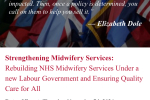Theo Clarke, one of the United Kingdom's delegated to the Council of Europe, spoke at the Parliamentary Assembly of the Council of Europe's meeting today. She highlighted the mounting pressures on maternity services in Gaza, caused by the ongoing war in the region. Please read the transcript of her speech below.
'Thank you, Mister President.
As a member of the UK delegation to the Council of Europe, I rise to speak in this debate about the mounting humanitarian crisis in Gaza.
I wish to focus today on the context for maternal and newborn health, and in particular the challenge of birth trauma.
As a recent member of the UK Parliament's International Select Development Committee, I wish to call attention to two of our recent relevant reports.
The first is on the humanitarian situation in Gaza and the second on the Foreign Commonwealth and Development Office's approach to sexual and reproductive health.
I also chaired the recent UK birth trauma inquiry, which looked in detail at the risks women face in childbirth, and that has lessons for all of us as member states on how to improve maternal health outcomes.
The UK strongly condemned the horrific attacks perpetrated on Israel by Hamas last year, but conflict has now ensued in response, and the situation in Gaza has become one of the worst humanitarian disasters in the world. The UN Secretary-General himself has said, "If there is a hell on earth, it is the lives of children in Gaza".
Our committee of parliamentarians visited Egypt to see a hospital in north Sinai, the closest region to Rafa in the Gaza Strip, and British MPs heard firsthand about the challenges facing the healthcare system in Gaza, which is falling apart.
The importance of skilled healthcare workers in the provision of maternal and newborn health is essential. Doctor Sebastian Taylor told our inquiry that most newborn deaths happen within the first few days after delivery and that most maternal deaths happen on the day of delivery. That tells us that the place where the mother delivers and the newborn arrives needs to be a place of considerable safety and quality of care. But how is this to be provided when only a third of Gaza's hospitals are still functioning and working with as little as 30% of their staff?
Nearly two million people are displaced, and it's becoming increasingly difficult to provide medical care to mothers and their newborn babies. We know there's a lack of health infrastructure, medical equipment, supplies including milk and medication, and there are very few facilities.
Almost all of maternal deaths are occurring in low income and middle income countries and particularly in conflict areas such as Gaza, with particularly high levels of maternal mortality.
We know that increasing access to high quality healthcare is an effective way to reduce maternal mortality and birth trauma.
The UK government recently stated in our White Paper on International Development that no woman or baby should die of preventable causes in pregnancy or childbirth.
So, I welcome that the UK has committed to the global financing facility for women, children, and adolescents of up to 95 million between now and 2025, but there is so much more that we can do.
So today, I call on all member states to commit to reducing the risk of maternal and newborn mortality and the rates of birth trauma in conflict zones, such as Gaza. We must listen to mothers on the ground. They urgently need our help and ensure that health outcomes for mothers and their babies are being improved to further save lives.'

